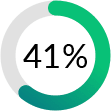The minimum fee for HECM is $2500 with an overall cap of $6000. Other fees include appraisal, and other closing costs such as title search and insurance, surveys, inspections and recording fees. For more specific fee details, talk to your lender.
Is a Reverse Mortgage right for me?
Are you looking to add some extra income to your life? Do you have a lot of equity in your home? A reverse mortgage can help you get money out of your home that you can enjoy today. Depending on your circumstances, a reverse mortgage may be a great choice giving you supplemental income for the rest of your life. To determine how much you may be eligible for use our reverse mortgage calculator.

Quick fact:
41% of people aged 55 to 64 don’t have any retirement savings at all
Am I eligible?
Most people get a type of reverse mortgage that’s called a Home Equity Conversion Mortgage (HECM), and is backed by the US government. You have to meet some specific criteria in order to qualify for this type of mortgage. It’s pretty simple, really.
Basic Criteria
- At least one borrower must be 62 or older
- Own your home or have significant equity
- Participate in an informational reverse mortgage counseling session with HUD
- Home must be well-maintained
- All property taxes and insurance must be paid
Related Topics:
How much can I get with a reverse mortgage?
| YOUR AGE | + | PROPERTY VALUE | = | AMOUNT YOU COULD RECEIVE |
|---|---|---|---|---|
| 62 | $250,000 | $111,500 | ||
| 74 | $250,000 | $129,750 | ||
| 84 | $250,000 | $153,250 | ||
| 62 | $350,000 | $156,100 | ||
| 74 | $350,000 | $181,650 | ||
| 84 | $350,000 | $214,550 |
Reverse Mortgage
As of 2012, there were 563,700 Reverse Mortgage Loans in the US. Based on current data, this number is expected to nearly double to 966,000 by 2030.
Some typical reverse mortgage questions:
The difference between the fair market value of an asset (like a home) and the amount of debt against that asset (like a mortgage balance).
It depends. If you need to go a nursing home for a short time (anything less than 12 months), you can return to your home. If, however, you make a permanent move (longer than 12 months) to a nursing home, you most likely will have to sell your home to pay off the reverse loan.
